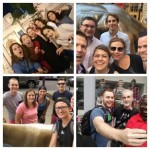
No matter how impressive your resume, an interview will ultimately determine whether or not you are suited for a job. Regardless of if you are applying for job positions in the medical profession in the medical profession or corporate world, your ability to convey your thoughts well and answer questions thoughtfully are crucial.
Here are some of the best ways to present yourself during an interview to increase your chances of landing the job.
Dress Well Down to the Details
Dressing well is one of the most obvious aspects of presenting yourself well during an interview. Not only should you dress accordingly, but you should also pay attention to the finer details. Does everything coordinate well? Are you formal enough for the role you are interviewing for? Do you have pet hair on your clothing? Are they wrinkled?
Take time the evening before your interview to iron and brush your clothing with a lint brush. Hang the clothing so that it doesn’t wrinkle overnight. For an extra touch, hang the outfit in the bathroom when you shower in the morning. The steam will help further reduce unsightly creases and wrinkles.
Enunciate Your Words and Speak Formally
If you are a casual, laid back individual who enjoys chatting and often says “yeah” rather than “yes” then you’ll need to adjust for your interview. Be sure to take your time when you speak and enunciate your words properly. Avoid slang and answer questions with yes and no rather than yeah or nope.
Once you have the job and build a rapport with your colleagues, you may revert to a more casual way of speaking. However, enunciation and proper language use convey professionalism and pride even years after being in the same position.
Body Language
Pay attention to your body language. When you walk into the interview keep your head up and make direct eye contact while shaking the interviewer’s hand. You want to convey confidence without speaking. When you take your seat, maintain proper posture and avoid slumping in your chair. Lean forward slightly when the interviewer is talking to express interest and attention.
If you tend to fidget when you are nervous or talk with your hands, simply clasp your hands in front of you and plant your feet on the floor. Be mindful of what your body is doing subconsciously, as repetitive movements can be distracting.
Arrive Early
Nothing is more stressful or unprofessional than appearing late and unprepared. Plan your route, parking, and potential traffic pitfalls the day before your trip. Have a plan B in case your suggested route or parkade are unavailable. When it comes to landing the job, it’s better to be safe than sorry.
Always leave early, even if you live down the street. Life has a funny way of throwing wrenches into the simplest of actions and plans. It’s always better to arrive early and while away time in the lobby than to rush in five minutes after the interview should have started because of an accident on the highway. If any issues should arise, call well in advance and apologize for the inconvenience.
Say Thank You and Ask for the Job
The people who interview you have plenty of other things they could be doing with their work day. Be appreciative of their time and convey that appreciation at the beginning and end of the meeting. Manners are memorable. For a finishing touch, be sure to send a thank you email to your contact within 24 hours after the interview.
At the end of your meeting, convey your interest in the job. Stating that you would very much like to take on this role shows your enthusiasm and dedication to the company interviewing you. The interview is often a chance for the interviewee to assess whether they want the role they have applied for. Asking for the job reassures the interviewer that you are interested.
Remember, being prepared will help you relax and appear confident so you can let your best qualities shine through.








